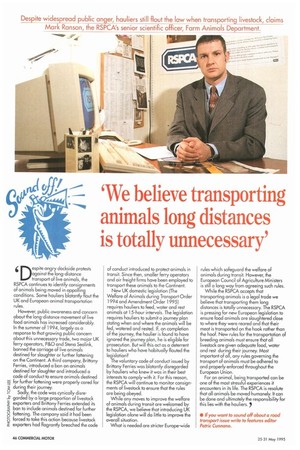'We believe transporting animals long distances is totally unnecessary'
Page 48

If you've noticed an error in this article please click here to report it so we can fix it.
6 espite angry dockside protests
against the long-distance transport of live animals, the RSPCA continues to identify consignments of animals being moved in appalling conditions. Some hauliers blatantly flout the UK and European animal transportation rules.
However, public awareness and concern about the long-distance movement of live food animals has increased considerably. In the summer of 1994, largely as a response to that growing public concern about this unnecessary trade, two major UK ferry operators, P&O and Steno Sealink, banned the carriage of live animals destined for slaughter or further fattening on the Continent. A third company, Brittany Ferries, introduced a ban on animals destined for slaughter and introduced a code of conduct to ensure animals destined For further fattening were properly cared for during their journey.
,2 Sadly, the code was cynically disre 1. garded by a large proportion of livestock > i exporters and Brittany Ferries extended its cban to include animals destined for further 8 fattening. The company said it had been 16forced to take this action because livestock 1 exporters had flagrantly breached the code
of conduct introduced to protect animals in transit. Since then, smaller ferry operators and air freight firms have been employed to transport these animals to the Continent. New UK domestic legislation {The Welfare of Animals during Transport Order 1994 and Amendment Order 1995) requires hauliers to feed, water and rest animals at 15-hour intervals. The legislation requires hauliers to submit a journey plan stating when and where the animals will be Fed, watered and rested. If, on completion of the journey, the haulier is found to have ignored the journey plan, he is eligible for prosecution. But will this act as a deterrent to hauliers who have habitually flouted the legislation?
The voluntary code of conduct issued by Brittany Ferries was blatantly disregarded by hauliers who knew it was in their best interests to comply with it. For this reason, the RSPCA will continue to monitor consignments of livestock to ensure that the rules are being obeyed.
While any moves to improve the welfare of animals during transit are welcomed by the RSPCA, we believe that introducing UK legislation alone will do little to improve the overall situation.
What is needed are stricter Europe-wide rules which safeguard the welfare of animals during transit. However, the European Council of Agriculture Ministers is still a long way from agreeing such rules. While the RSPCA accepts that transporting animals is a legal trade we believe that transporting them long distances is totally unnecessary. The RSPCA is pressing for new European legislation to ensure food animals are slaughtered close to where they were reared and that their meat is transported on the hook rather than the hoof. New rules for the transportation of breeding animals must ensure that all livestock are given adequate food, water and rest during their journey. Most important of all, any rules governing the transport of animals must be adhered to and properly enforced throughout the European Union. For an animal, being transported can be one of the most stressful experiences it encounters in its life. The RSPCA is resolute that all animals be moved humanely. It can be done and ultimately the responsibility for this lies with the hauliers.
































































































